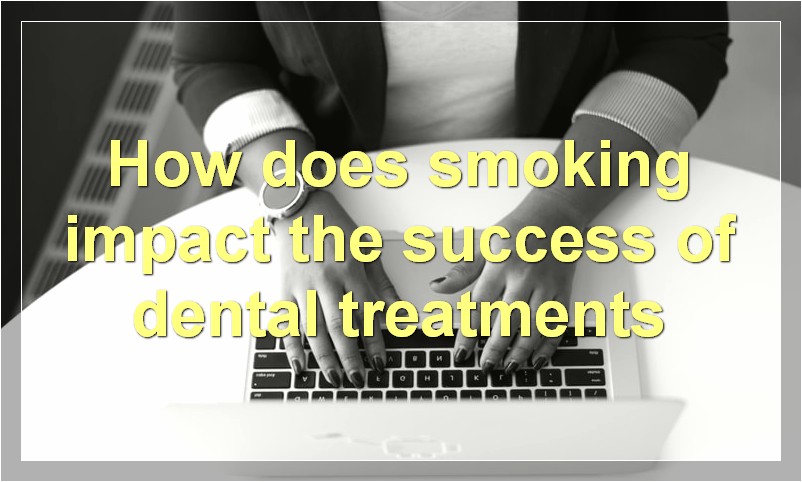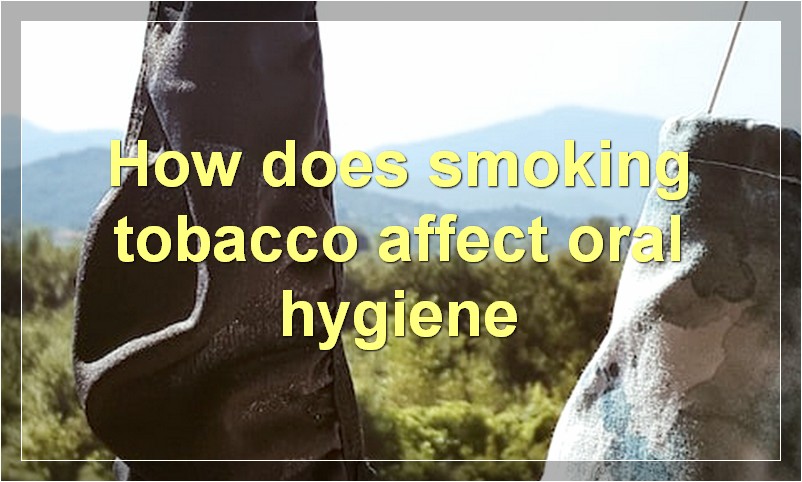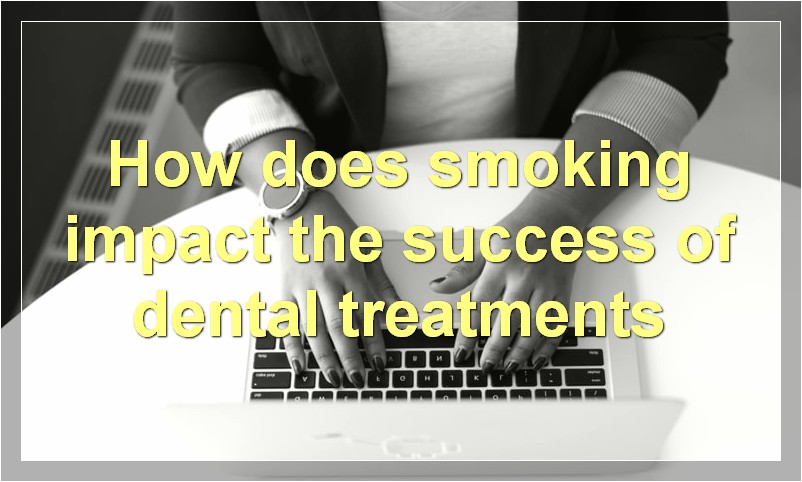Your teeth can tell a lot about your habits, and that includes whether you smoke cigarettes. If you’re a smoker, there are some telltale signs that will show up in your mouth. Here’s what to look for and what you can do about it.
What are the long-term effects of smoking on dental health?
Smoking is one of the leading causes of preventable death in the world, and has well-documented negative effects on almost every organ in the body. The harmful chemicals in cigarettes take a toll on dental health as well, causing gum disease, tooth loss, and other problems.
The most obvious way that smoking harms dental health is by causing bad breath. The tar and nicotine in cigarettes stick to teeth and tongue, and also contribute to a build-up of plaque. Plaque is a sticky film of bacteria that forms on teeth, and if it’s not removed regularly through brushing and flossing, it can harden into tartar. Tartar can only be removed by a professional cleaning, and if it’s not removed, it can lead to gum disease.
Gum disease is an infection of the gums that can cause redness, swelling, and bleeding. If it’s not treated, it can progress to periodontitis, which destroys the bone around teeth. Smoking makes gum disease worse because it decreases blood flow to the gums and impairs the ability of cells to fight infection.
Tooth loss is another potential consequence of smoking. Cigarettes promote tooth decay by reducing saliva production (which helps keep teeth clean) and increasing the amount of sugar in the mouth (which feeds bacteria). smokers are also more likely to develop oral cancer.
The good news is that quitting smoking can have immediate and long-term benefits for dental health. Within just a few days of quitting, teeth will start to look cleaner and brighter. Gums will bleed less, and eventually the inflammation and puffiness will subside. In the long run, quitting smoking can help reduce the risk of gum disease, tooth loss, and oral cancer.
How does smoking impact the success of dental treatments?

Smoking is one of the most significant risk factors for developing periodontal disease. It has also been shown to decrease the success of dental implant placement and other periodontal treatments.
Periodontal disease is an infection of the gum tissue that can eventually lead to bone loss and tooth loss. Smoking is a major risk factor for developing this disease because it decreases the ability of the body to fight off infection.
In addition, smoking has been shown to decrease the success of dental implant placement and other periodontal treatments. This is because smoking decreases the blood supply to the gums, which can impact healing.
If you are a smoker, quitting smoking is one of the best things you can do for your oral health. If you are considering dental implants or another periodontal treatment, be sure to tell your dentist so they can take steps to ensure the best possible outcome.
What are the risks of dental complications from smoking?
Smoking is one of the leading causes of preventable death in the United States. Each year, more than 480,000 people die from smoking-related illnesses, including cancer, heart disease, and stroke.
Smokers are also at increased risk for a number of dental complications, including gum disease, tooth decay, and tooth loss. In fact, smokers are four times more likely to develop periodontal disease than nonsmokers. Periodontal disease is an infection of the gums that can destroy the bone supporting your teeth.
Smoking also increases your risk for developing tooth decay. The nicotine and other chemicals in cigarettes stick to your teeth and gums, promoting the growth of bacteria that cause tooth decay. Smoking also dries out your mouth, which can lead to an increase in plaque buildup.
In addition to increasing your risk for gum disease and tooth decay, smoking also puts you at greater risk for tooth loss. Smokers are three times more likely to lose their teeth than nonsmokers.
If you smoke, it’s important to visit your dentist regularly for cleanings and checkups. Be sure to tell your dentist that you smoke so they can monitor your oral health closely. quitting smoking is the best way to reduce your risk of dental complications.
What are the most common signs that a dentist can see that a patient smokes?
Smoking is one of the worst things that you can do for your teeth and gums. Not only does it increase your risk of developing gum disease, it can also lead to yellowing of the teeth, bad breath, and an increased risk of oral cancer. While many smokers are aware of these risks, they may not be aware of the fact that their dentist can often tell if they smoke simply by looking at their teeth. Here are some of the most common signs that a dentist can see that a patient smokes:
1. Stained teeth: One of the most obvious signs that a patient smokes is stained teeth. This is caused by the tar and nicotine in cigarettes, which can lead to heavy staining of the teeth. In some cases, the staining can be so severe that it becomes difficult to whiten the teeth, even with professional dental cleaning.
2. Yellowing of the teeth: In addition to staining, smoking can also cause the teeth to become yellowed or discolored. This is because the tar and nicotine in cigarettes can actually change the color of the tooth enamel, making it appear yellow or brown.
3. Bad breath: Another common sign that a patient smokes is bad breath. This is because cigarettes contain chemicals that cause the mouth to dry out, which leads to an increase in bacteria growth and bad breath.
4. Gum disease: Smoking is one of the leading causes of gum disease, which is an infection of the gums that can lead to tooth loss. Gum disease is caused by the buildup of plaque and tartar on the teeth, which leads to inflammation and irritation of the gums. Smoking makes it harder for the body to fight off infection, which can make gum disease worse.
5. Oral cancer: Finally, smoking increases the risk of developing oral cancer, which is a form of cancer that affects the lips, tongue, throat, or mouth. Oral cancer is caused by the exposure to harmful chemicals in cigarettes, which damage DNA and healthy cells in the mouth. If you notice any suspicious lumps or bumps in your mouth, be sure to see your dentist right away for an examination.
If you smoke, it’s important to be aware of the ways that it can impact your oral health. Be sure to see your dentist regularly for checkups and cleanings so that they can catch any problems early on. And if you’re ready to quit smoking, talk to your doctor about ways to help you kick the habit for good!
How does smoking increase the risk for gum disease?
Smoking is a well-established risk factor for gum disease. In fact, smokers are up to six times more likely to develop gum disease than nonsmokers, according to the American Academy of Periodontology (AAP).
Gum disease is an infection of the tissues that surround and support your teeth. Gum disease is caused by plaque, a sticky film of bacteria that constantly forms on your teeth. If plaque isn’t removed, it can turn into tartar (calculus), which is much harder to remove.
Smoking makes it harder for your body to fight off infections, including gum disease. That’s because smoking weakens your immune system and decreases the flow of blood to your gums. This combination makes it harder for your gums to heal after being injured by plaque.
Smoking also increases your risk for other types of infections, such as oral cancer. In fact, smokers are six times more likely to develop oral cancer than nonsmokers, according to the AAP.
If you smoke and have gum disease, you’re more likely to develop serious complications from the disease, such as bone loss and tooth loss. You’re also at increased risk for developing oral cancer.
If you smoke, the best thing you can do for your oral health is to quit. Quitting smoking will not only improve your overall health, but it will also reduce your risk for gum disease and other oral health problems.
How does smoking tobacco affect oral hygiene?

Smoking tobacco is one of the leading causes of poor oral hygiene. The chemicals in tobacco can discolor your teeth, cause bad breath, and contribute to gum disease. Smoking also decreases your ability to fight off infection, which can lead to tooth loss. If you smoke, it’s important to take extra care of your mouth by brushing and flossing regularly and visiting your dentist for checkups and cleanings.
What are the staining effects of smoking on teeth?
Smoking is one of the leading causes of tooth staining. The nicotine and tar in cigarettes, cigars, and pipe tobacco can cause yellowing and browning of your teeth. In addition, these substances can also lead to other dental problems, such as gum disease and tooth decay. If you smoke, you may be more likely to develop stained teeth.
There are several ways to help prevent tooth staining from smoking. You can try using a whitening toothpaste or mouthwash, which can help to remove some of the surface stains on your teeth. You can also talk to your dentist about getting your teeth professionally cleaned or whitened. If you quit smoking, you will also help to reduce your risk of developing tooth stains.
How does smoking cause bad breath?
Smoking is one of the leading causes of bad breath. The toxins in cigarettes stain your teeth and cause your gums to recede, which leads to bacteria buildup and bad breath. Smoking also dries out your mouth, which reduces saliva production and allows bacteria to thrive.
What are the risks of oral cancer from smoking?
Smoking is the leading cause of preventable death in the United States, and tobacco use is the cause of about 90% of all lung cancer deaths. Cigarette smoking causes many types of cancer, including cancers of the lung, esophagus, larynx (voice box), mouth, throat, kidney, bladder, pancreas, stomach, and cervix.
Cigar smoking also causes cancer. Chewing tobacco and snuff also increase the risk for several types of cancer, including cancer of the cheek, gums, and lining of the mouth.
People who smoke cigarettes have the greatest risk of developing oral cancer. Other risk factors for developing oral cancer include heavy alcohol use, betel nut use, and a history of Human Papillomavirus (HPV) infection.
Most oral cancers are found on the lips, tongue, or floor of the mouth. Symptoms may include a sore that does not heal; bleeding; white or red patches; pain; numbness; or a change in how your teeth fit together when you bite.
If you use tobacco products or have other risks for oral cancer, see your dentist or doctor for regular checkups.
How can quitting smoking improve dental health?
When it comes to smoking and dental health, most people are aware of the risks of gum disease and tooth loss. However, few realize that quitting smoking can actually improve your dental health in a number of ways. Here’s a look at how quitting smoking can help your teeth and gums:
Plaque buildup: Smoking is a major cause of plaque buildup on teeth. Plaque is a sticky film of bacteria that forms on teeth and can lead to cavities and gum disease. When you quit smoking, the plaque will start to disappear.
Stained teeth: Smoking also causes teeth to become stained and discolored. Quitting will help your teeth regain their natural color.
Bad breath: Smoking is a major cause of bad breath. Quitting will help freshen your breath.
Tooth decay: Smoking increases the risk of tooth decay by reducing saliva flow. Saliva helps protect teeth from decay by washing away food and bacteria. When you quit smoking, your saliva flow will increase and help reduce your risk of tooth decay.
Gum disease: Smoking is a major cause of gum disease, which can lead to tooth loss. Quitting will help improve the health of your gums.
Overall health: Quitting smoking has numerous benefits for your overall health, including reducing your risk of heart disease, cancer, and other illnesses. Improving your overall health will also help improve your dental health.




